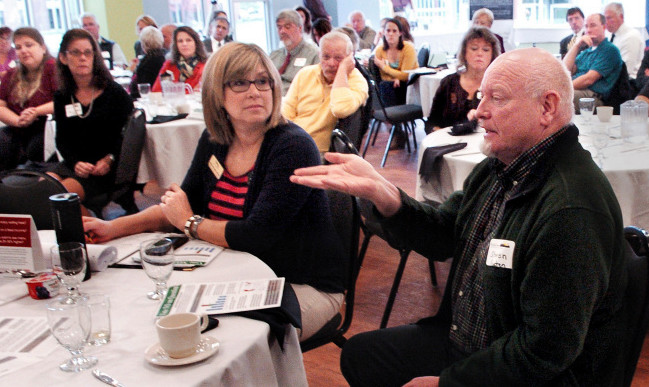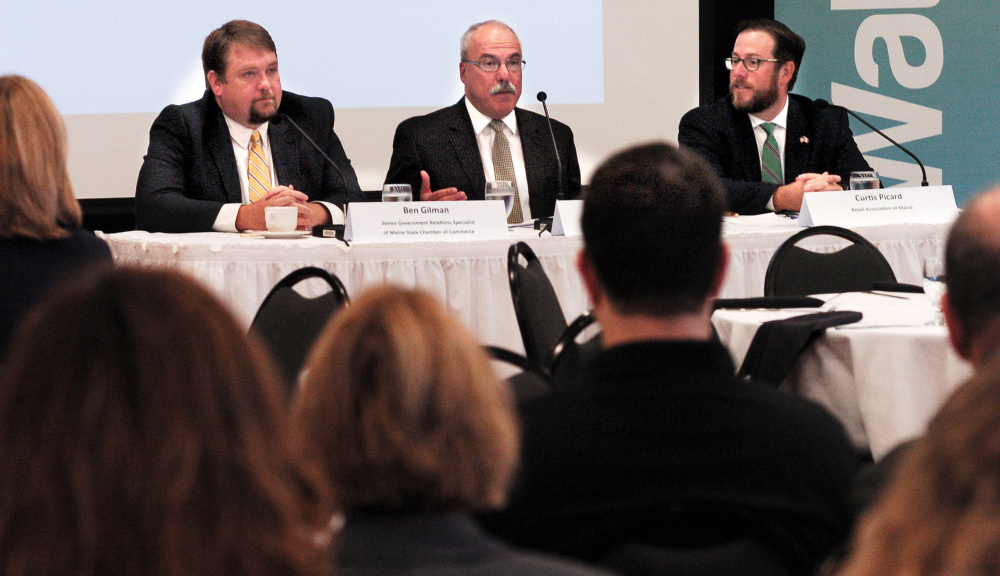WATERVILLE — Greg Dugal said he’s concerned about a proposed increase in restaurant servers’ wages that would be mandated if a statewide referendum question passes in the Nov. 8 election.
It would cause restaurant owners to lose their profit in the first year and start having losses in the second year, when they’ll be forced to increase prices or eliminate workers, according to Dugal, who is director of government affairs for the Maine Restaurant and Maine Innkeepers associations.
“What we take for granted in Portland, where you can’t find a chef for $12, these people (in rural counties) can’t pay $10,” Dugal said, calling Question 4 a “job-killing referendum.”
On the other hand, Steven Keaten, 59, of China, said he supports the minimum-wage increase. He criticized assertions that the proposal is being driven by out-of-state interests, saying he’d gathered hundreds of signatures to get the question on the ballot.
And he said that making servers subsidize their wages with tips to reach the full mnimum wage is like “slavery.”
The comments from Dugal and Keaten came Thursday morning during a Mid-Maine Chamber of Commerce business breakfast at Thomas College, laying bare the personal and sharp disagreements over decisions facing Maine voters at the ballot box in just under a month.
The Waterville area chamber of commerce, which represents the interests of local business owners, opposes the minimum-wage increase, Question 4, as well as Question 2, which would impose a tax on high-wage earners to help pay for education spending.
Opponents of Questions 2 and 4 say the statewide referendum questions will hurt the economy and cost Maine jobs, but supporters say they are necessary to support education and help people who work in low-wage industries survive.
At Thursday’s chamber talk, attended by dozens of people, a panel opposed to both referendum questions spoke — Dugal; Ben Gilman, senior government relations specialist for the chamber; and Curtis Picard, executive director of the Retail Association of Maine.
During the panel discussion, Gilman said Question 2’s proposed increase would get put “basically on the backs of the families of our small businesses.”
“We’re against Question 2 not because we don’t support education funding … but you’ve got to look behind the question to kind of look at the details of it,” he said.
Question 2 proposes adding a 3 percent tax on individual taxable income over $200,000 to create a fund to support public education at all grade levels. The money would be used to supplement the state’s general fund, which is required to pay at least 55 percent of the total cost of kindergarten-through-grade 12 public education when it falls short of its goal. The money would go toward “direct support” for students, meaning teachers’ salaries and benefits, and not administrators’.
Under the proposal, individual taxable income also would include limited liability companies, or LLCs, sole proprietors and S corps, which are known as “pass through” entities, according to David Heidrich, director of communications for the Maine Department of Administrative and Financial Services, in an interview after the chamber talk.
With such entities, it’s assumed that the profits will pass through to the owners of the business, who will use an individual income tax return to pay taxes. The state estimates that just over 16,000 households in Maine will be affected by this legislation if it passes, or about 2.9 percent of the state. Of those households, 10,625, or 1.9 percent of the state, get some kind of pass-through income, Heidrich said.
The increase would bring Maine’s income tax to 10.15 percent, which would be the second-highest income tax in the country, according to Gilman.
“That’s a big deal, when you have an income tax rate over 10 percent,” he said. The chamber believes the high rate would hurt the state’s chances of attracting business.
QUESTION OF FAIRNESS
Gilman also criticized how the money generated from Question 2 would be distributed throughout the state, saying that the southern portions of the state would receive most of the funds while rural districts that need the money most would receive less, and some would receive none.
“It’s just not fair in terms of education distribution,” he said, adding that he thinks Maine needs to revisit how it funds education.
However, supporters say the chamber is spreading misinformation to the voters.
John Kosinski, the campaign manager for Yes on Question 2, said in an interview after the chamber talk that governor-appointed experts who reviewed the funding formula a few years ago said the formula was among one of the most equitable in the country.
Kosinski also said that half of the towns receiving no money don’t have schools.
“The funding formula isn’t the problem,” he said. “The problem is there isn’t enough resources going into the formula, and Question 2 solves that problem.”
The increased tax on income above $200,000 is necessary because groups such as the chamber have fought hard for tax cuts for high-earning Mainers, Kosinski said. He also said that studies show 96 percent of small businesses won’t be affected because they don’t make more than $200,000 per year.
Kosinski said he thinks this will help business in Maine, as it will provide more funding for technical education, which the state is lacking. The Maine Small Business Coalition has said it supports the referendum question.
Meanwhile, Picard, from the Maine Retailers Association, said he worries that his son, who will be age 16 in 2020, won’t be able to get that “critical first job” to teach him about responsibility if Question 4 passes and the minimum wage increases to $12 by that time.
He said that at another event where he was speaking and made that observation, a business owner stood up and said he had calculated his extra costs from the proposed increase, and he wouldn’t be able to hire his son.
Picard said he wonders how Maine is going to keep its young people if it can’t even give them their first job.
‘TOO MUCH, TOO FAST’?
Question 4 on the November ballot asks: “Do you want to raise the minimum hourly wage of $7.50 to $9 in 2017, with annual $1 increases up to $12 in 2020, and annual cost-of-living increases thereafter; and do you want to raise the direct wage for service workers who receive tips from half the minimum wage to $5 in 2017, with annual $1 increases until it reaches the adjusted minimum wage?”
Opponents of the question, including the chamber, say the increase is “too much, too fast” and that the quick rise in wages will hurt both employment rates and business profits. Some also worry that the proposal to eliminate the tip credit will devastate Maine restaurants and hurt servers’ pockets.
Advocates for a higher minimum wage filed more than 76,400 petition signatures in January to place the measure on the Nov. 8 election ballot.
The measure — which is backed by the Maine People’s Alliance, the Maine AFL-CIO and the Maine Small Business Coalition — would raise the state’s minimum wage from the current $7.50 an hour to $9 an hour in 2017, followed by annual $1 increases until 2020. Subsequent increases would be indexed to inflation.
Despite concerns from employers, a recent survey found majority support for the ballot question.
A poll conducted last month by the Portland Press Herald and University of New Hampshire Survey Center found that about 60 percent of respondents will vote “yes” on Question 4. Even so, a majority of those respondents also believed an increase would hurt small businesses.
The people who would be hit hardest by this proposal, according to Picard, are the elderly and people on fixed incomes who will have to face increased prices.
However, he also said retailers don’t have much room to raise prices with competition from online retailers, so they may have to cut back on costs by eliminating jobs.
Dan Bernier, who moderated the chamber panel, said the chamber supported a proposed opposing question for a $10 minimum wage. “Our concerns were that this was too extreme,” he said.
Supporters of the referendum disagree.
Mary Anne Turowski, director of politics and legislation for Maine SEIU local 1989, said in an interview after the talk that the opposition’s support of a smaller increase was “too late at that point, in my opinion.”
“Their concerns about ‘too soon, too fast’ are hollow because they had multiple years (to pass legislation),” she said.
Matt Schlobohm, executive director of the Maine AFL-CIO, a federation of labor unions, said that what’s good for low-wage workers is good for the economy.
“This is the right thing to do, and it’s good economics,” he said in an interview after the talk. Schlobohm pointed out that the state has raised the minimum wage 30 times, and each time “you hear the ‘sky is falling’ arguments.”
Schlobohm said the wage increase is needed as the costs of housing, groceries and other basics continue to rise.
“This referendum is about seniors who can’t retire. It’s about people who are spending endless hours away from their families,” he said.
OUT-OF-STATE MONEY
While panel members said they’ve spoken with servers who oppose the referendum because they worry they’ll lose their tips, with which they average a $25-per-hour wage or higher, the latest numbers from the state Bureau of Labor Statistics show that the median hourly wage for servers is $9.06. Employers report the tips earned on credit cards, which has allowed the state to track an average, Schlobohm said.
He also said this referendum won’t eliminate tips, but will just secure a stable wage for servers. In the other seven states in the country that cover servers with a regular minimum wage, servers can make tips on top of that money, Schlobohm said.
Members of the panel said out-of-state money was the main source of funding for both questions, and that referendums were not the right way to create legislation.
According to records provided by the Maine Commission on Governmental Ethics and Election Practices, the Maine People’s Alliance, which says it works to create positive social change, reported receiving more than $200,000 in cash contributions in its October quarterly report to support Question 4. It received about $170,000 from people, PACs and organizations based in Maine. About $11,500 came from out-of-state contributors — the American Sustainable Business Council and the United Food and Commerical Workers International Union, both based in Washington, D.C. — and the rest were contributions of $50 or less, which don’t need to be identified.
The Maine AFL-CIO Committee on Political Education PAC, which represents the interests of the federation of 160 local unions, reported receiving about $5,900 from Maine-based organizations and people in the reports its filed since April. Out-of-state contributions, which mainly came from union chapters in Massachusetts and New Hampshire, totaled $320.
In contrast, Maine People for Maine Jobs, which opposes Question 4, reported $27,150 in contributions from Maine-based sources and none from out of state in its October report. Another opposing group, Restaurateurs for a Strong Maine Economy, received $19,100 from Maine-based sources, according to its October report. It also received $7,500 from a Florida organization, $2,000 from New Hampshire and $2,500 from Washington, D.C.
Madeline St. Amour — 861-9239
mstamour@centralmaine.com
Twitter: @madelinestamour
Send questions/comments to the editors.





Success. Please wait for the page to reload. If the page does not reload within 5 seconds, please refresh the page.
Enter your email and password to access comments.
Hi, to comment on stories you must . This profile is in addition to your subscription and website login.
Already have a commenting profile? .
Invalid username/password.
Please check your email to confirm and complete your registration.
Only subscribers are eligible to post comments. Please subscribe or login first for digital access. Here’s why.
Use the form below to reset your password. When you've submitted your account email, we will send an email with a reset code.